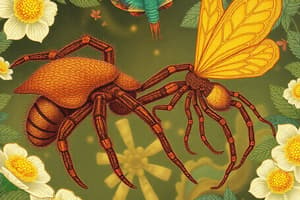Podcast
Questions and Answers
What is a characteristic of parasitism?
What is a characteristic of parasitism?
- Mutual benefit to both organisms
- One-way benefit to the parasite (correct)
- The host relies on the parasite for survival
- No harm to the host
Which type of parasitism involves the parasite living inside the host?
Which type of parasitism involves the parasite living inside the host?
- Endoparasitism (correct)
- Obligate parasitism
- Facultative parasitism
- Ectoparasitism
What is an example of an obligate parasite?
What is an example of an obligate parasite?
- Fleas on dogs
- Lice on humans
- Tapeworms in the human gut (correct)
- All of the above
How do some parasites manipulate the host's behavior or immune system?
How do some parasites manipulate the host's behavior or immune system?
What is a common adaptation of parasites to attach to or penetrate the host?
What is a common adaptation of parasites to attach to or penetrate the host?
What is a result of the parasite-host relationship in parasitism?
What is a result of the parasite-host relationship in parasitism?
What is the primary beneficiary in a parasitic relationship?
What is the primary beneficiary in a parasitic relationship?
Which type of parasite can survive with or without a host?
Which type of parasite can survive with or without a host?
What is a common effect of parasitism on the host?
What is a common effect of parasitism on the host?
What is a specialized structure that some parasites develop to feed on their hosts?
What is a specialized structure that some parasites develop to feed on their hosts?
How do some hosts respond to parasitic infections?
How do some hosts respond to parasitic infections?
What is a potential ecological effect of parasitism?
What is a potential ecological effect of parasitism?
What is a strategy used by some parasites to evade host defenses?
What is a strategy used by some parasites to evade host defenses?
What is a potential effect of parasitism on nutrient cycling?
What is a potential effect of parasitism on nutrient cycling?
Flashcards are hidden until you start studying
Study Notes
Parasitism
A type of symbiotic relationship where one organism, the parasite, benefits from the other organism, the host, while causing harm to the host.
Characteristics:
- One-way benefit: only the parasite benefits
- Harm to the host: the host is negatively affected by the parasite
- Dependence: the parasite relies on the host for survival
Types of Parasitism:
- Ectoparasitism: parasite lives on the outside of the host (e.g. lice, ticks)
- Endoparasitism: parasite lives inside the host (e.g. tapeworms, protozoa)
- Obligate parasitism: parasite cannot survive without the host
- Facultative parasitism: parasite can survive without the host, but benefits from the relationship
Examples:
- Tapeworms in the human gut
- Malaria-causing protozoa in humans
- Fleas on dogs
- Lice on humans
Adaptations:
- Parasites often develop specialized structures to attach to or penetrate the host
- Some parasites produce chemicals to manipulate the host's behavior or immune system
- Parasites may evolve to evade the host's immune system or exploit its weaknesses
Parasitism
- A type of symbiotic relationship where one organism, the parasite, benefits from the other organism, the host, while causing harm to the host.
Characteristics of Parasitism
- One-way benefit: only the parasite benefits from the relationship.
- Harm to the host: the host is negatively affected by the parasite.
- Dependence: the parasite relies on the host for survival.
Types of Parasitism
- Ectoparasitism: Parasite lives on the outside of the host, e.g. lice, ticks.
- Endoparasitism: Parasite lives inside the host, e.g. tapeworms, protozoa.
- Obligate Parasitism: Parasite cannot survive without the host.
- Facultative Parasitism: Parasite can survive without the host, but benefits from the relationship.
Examples of Parasitism
- Tapeworms in the human gut.
- Malaria-causing protozoa in humans.
- Fleas on dogs.
- Lice on humans.
Adaptations of Parasites
- Develop specialized structures to attach to or penetrate the host.
- Produce chemicals to manipulate the host's behavior or immune system.
- Evolve to evade the host's immune system or exploit its weaknesses.
Symbiosis: Parasitism
Definition and Characteristics
- Parasitism is a type of symbiotic relationship where one species (parasite) benefits, while the other species (host) is harmed.
- The parasite relies on the host for survival, food, or resources, while the host is negatively affected, often experiencing reduced fitness or even death.
Types of Parasites
- Obligate parasites: cannot survive without a host.
- Facultative parasites: can survive with or without a host.
- Temporary parasites: only parasitic for a portion of their life cycle.
Examples of Parasites
- Tapeworms: endoparasites that live in the digestive systems of animals, feeding on nutrients.
- Fleas: ectoparasites that feed on the blood of mammals and birds.
- Malaria parasites: endoparasites that infect red blood cells, causing disease.
Adaptations of Parasites
- Specialized feeding structures: parasites develop specialized structures to feed on their hosts.
- Immune evasion: parasites can evade the host's immune system to avoid detection and elimination.
- Reproductive strategies: parasites produce large numbers of offspring to increase their chances of survival and transmission.
Host-Parasite Interactions
- Host defense mechanisms: hosts develop defense mechanisms, such as immune responses, to combat parasites.
- Parasite countermeasures: parasites evolve countermeasures to evade or overcome host defenses.
Ecological Importance of Parasitism
- Population regulation: parasites regulate host populations, influencing ecosystem dynamics.
- Nutrient cycling: parasites influence nutrient cycling by altering host nutrient uptake and allocation.
Studying That Suits You
Use AI to generate personalized quizzes and flashcards to suit your learning preferences.



